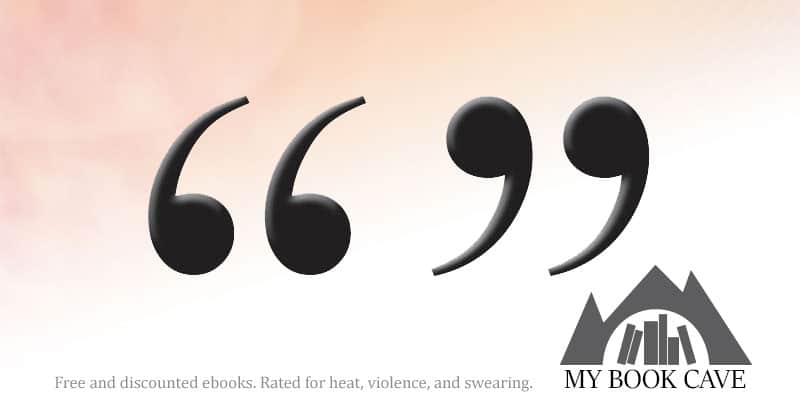
At Book Cave, we see authors using a variety of single and double quotation marks in text, especially in dialogue. Which way is the “right” way to do it? When should a double quotation mark be used versus a single quotation mark?
The answer is really simple but depends in large part on what audience you’re writing to: American or British.
Americans Always Use Double Quotes
American authors should always, always, always use double quotation marks, whether in dialogue or in emphasizing something in the text, unless they are quoting something inside a quote. There are some exceptions for certain disciplines like philosophy, theology, and linguistics, but unless you are in one of those, you don’t have to worry about it. Yes, it’s as simple as that. (We’ll explain why there is so much variation in a minute, so stay tuned.)
American: “I think that’s a great idea,” she said.
Note that the punctuation goes inside the quotation mark, not outside.
British Often Use Single Quotes
British formatting, on the other hand, often uses single quotation marks for dialogue and emphasis. However, some British publishers follow the American rules of using double quotes.
British: ‘I think that’s a great idea,’ she said.
Quote Inside a Quote
When something is quoted inside a dialogue, American formatting uses single quotes inside the double quotes. Conversely, British formatting uses double quotes inside of single quotes.
American: “She just said ‘That should work’ and walked out the door,” he clarified.
British: ‘She just said “That should work” and walked out the door,’ he clarified.
When a single quote is next to a double quote, no space should be put between them, although inserting a “thin space” in a formatting program does make them look nicer and easier to see.
For Scare Quotes or Emphasis
American authors should use double quotes for scare quotes (to show a phrase is being used in an ironic or nonstandard way) or for emphasis. British will generally use single quotes. Yes, again, it’s that simple. Americans will leave the punctuation inside the scare quote, but British writers will often put it outside. Please note that periods and commas in America always go inside the quotes, but there are exceptions to other punctuation (colons, semi-colons, exclamation points, and question marks) which we cover in another post.
American: Privately, he thought she was nothing like a “hot mama.”
British: Privately, he thought she was nothing like a ‘hot mama’.
Why We Have Confusion
Some American authors insist on using single quotes for emphasis throughout their books, and there are many websites that condone this, saying that single quotes outside of dialogue mean you intend sarcasm or the opposite of what you are quoting. The problem is, these website bloggers are not experts, and we have a huge number of people using single quotes for all sorts of imaginary reasons. The increase in self-publishing, more crossover with American and British literature, and editors who really aren’t that skilled has only added to the confusion.
We can find nothing to support the single quotation mark in the Chicago Manual of Style, which is the standard for most American publishers. In fact, the book encourages using double quotes at all times. Please throw out use of single quotes for scare quotes and rely on double quotes; in some cases, it may even better to use italics (like when highlighting key terms or for emphasis). PLEASE limit all of these, however. If you can take them out without ruining your meaning, do it. Too many words with quotation marks (not including dialogue) makes the words mean absolutely nothing to the reader and are often seen as some unintelligible whim of the author.
Exceptions
As with any rule in the English language, there are exceptions. Certain disciplines like philosophy, theology, and linguistics do use the single quote for emphasis—and leave the punctuation outside the quotes. They have complete style sheets that tell them how to format. But generally, these will not apply to authors, especially fiction authors.
What We Like to See
We prefer American formatting because most of our current subscribers are American, but we do accept British formatting as well. (We admit that it is rare for us to accept books with the punctuation outside emphasis quotes, however, because this is horribly distracting to Americans.) The most important thing is that the formatting is done consistently. Regardless of whether American or British formatting is used, all quotation marks should be “smart quotes,” or quotes that curve toward the text.
The same symbol that is used for single quotes is also used for contractions and possessives, although a better word for those would be “apostrophe.” We’ll talk more about correct apostrophe usage for omitted letters and possessives in our next grammar blog post.
















I’m writing a book and there is this question in my head about whether I should put single quotes around a purposely misspelled word or just leave it alone. Here’s the text:
“What about the red dot in front of the heli–?” he looks at me.
“Helicopter.” I finish.
“Helicomfer! What about the red marking next to the helicomfer?” He still didn’t say it right.
The explanation for this text is that a little boy is looking to a girl to ask how to say a word. She says the word correctly, but him being the little boy he is, he doesn’t say it correctly. So should I put single quotes around “Helicomfer” or just leave it alone?
I would just leave it as you have it, without single quotes.
I’m writing a fiction novel that is copywrite already and is in first person. The main character is telling a bed time story. I’m confused about the usage of single quotes within the the double quotes. Should I quote the character telling the story at the beginning and end of each paragraph and single quote the dialogue within that paragraph for example:
“As he rode into the castle, the knight saw the commotion and called near to a blacksmith, ‘What ho, friendly tradesmen! What doth cause such strife and chaos in this quaint village?'”
“The princess, good sir!” the blacksmith said. ‘She has been stolen by the dragon of the swamps.'”
“Cowards! All of you! Indy and I shall go alone to fell the terrible creature and save the damsel,” the knight proclaimed.
“As our brave knight and his trusty mount neared the edge of the swamps, he readied for battle. Strapping on his armor and his sword to his side, he gathered up his shield. Upon finding stable ground firm enough for his horse and in his full regalia, HE CHARGED!”
For a long story like this, I would remove the outer quotation marks and just use double quotation marks for dialog. Doing otherwise will just be confusing to the reader.
For example:
I curled up on the couch next to Mom as she flipped open the storybook. “Our story picks up with the brave knight who had just arrived at the castle,” Mom began.
As he rode into the castle, the knight saw the commotion and called near to a blacksmith, “What ho, friendly tradesmen! What doth cause such strife and chaos in this quaint village?”
“The princess, good sir!” the blacksmith said. “She has been stolen by the dragon of the swamps.”
“Cowards! All of you! Indy and I shall go alone to fell the terrible creature and save the damsel,” the knight proclaimed.
As our brave knight and his trusty mount neared the edge of the swamps, he readied for battle. Strapping on his armor and his sword to his side, he gathered up his shield. Upon finding stable ground firm enough for his horse and in his full regalia, HE CHARGED!
If a character’s dialog consists only of the memo she is reading aloud, how should it appear within the quotation marks?
You would put it in double quotation marks, since she is reading it aloud.
I am British born, but have lived in Canada most of my life. I write action/adventure novels and always use the ‘American’ standard.
One reason why I stop reading British books using single quotes is because the TTS on my iPad gets confused with them, and it makes the reading experience unpleasant. I don’t use the TTS from any disability, but to speed my reading and retention. The software, when it sees an apostrophe, treats it like an end quote if it is embedded within dialogue. (Don’t is read as Don tee; we’ll as we el el, can’t as can tee. You get the picture). I’m sure if single-quote authors were aware that disabled people who have to use TTS will stop reading their books, they may eventually change to, what I consider, a more sensible format.
Regards,
Chris Fox
I don’t know what kind of TTS you’re using but both apps or google extension that I’m using, or the ones I’ve previously used, not once have ever I encountered that issue. If your TTS have trouble reading words like “can’t”… that’s neither the author’s nor editor’s fault, or anybody else for that matter, for failing to anticipate this act of sheer folly.
If anything, instead of changing format you should consider changing apps or software. There’re so many other alternatives that are free and still perform much better than your worse-than-Google-Translate TTS.
I am writing a novel where they are texting each other. Should the text dialogue be in single or double quotes?
Thank you!
If you’re using quotes to show texts, you would use double quotes. I’ve also seen text messages displayed in italic, so you could do that instead, if you prefer.
When one is trying to emphasize a word in a novel that is not dialogue what kind of quotation mark should one use? For example:
I’m kicking myself for not putting “casual wear only” on the invitations. I know I’m the source of my own discomfort but I whine to Mary anyways “I hate this, so many people trying to make me look prettier makes me feel uglier every time.”
This sentence is similar to one I’m using (it’s been altered for obvious reasons) but I instinctively feel like the use of the double quotation mark on “casual wear only,” especially in this instance is so close to dialogue it may be confusing, however I believe it’s technically correct regardless. Any guidance on this would be most appreciated.
The double quotation mark is, as you said, still correct.
I’m kicking myself for not putting “casual wear only” on the invitations. I know I’m the source of my own discomfort, but I whine to Mary anyway, “I hate this, so many people trying to make me look prettier makes me feel uglier every time.”
The dialogue tag, “I whine to,” and the comma following it help make it clear that what follows is dialogue rather than scare quotes.
How would you use single/double (American) when the single quote falls at the end of a double quoted sentence, e.g., “they said, ‘cat and the hat of course’.”
Does the single quote go after or before the period?
The single quote still goes after the period:
“they said, ‘cat and the hat of course.'”